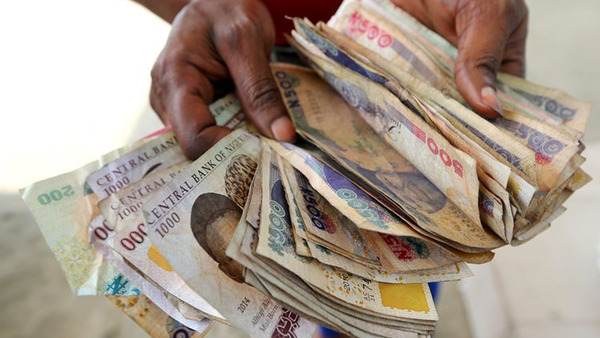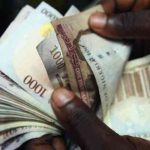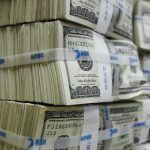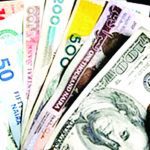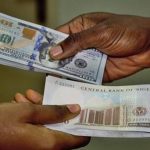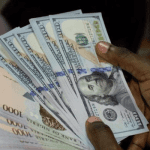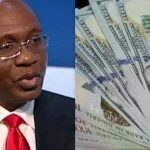The Naira has regained one-fifth of value in the past five weeks as increased foreign exchange inflows saw Nigeria’s forex reserves rising by $1.04 billion in the first quarter of this year.
The reserves, which had ended 2023 at $32.912 billion, closed weekend at $33.952 billion, an increase of $1.038 billion.
The build-up of the reserves came within the same period the Central Bank of Nigeria (CBN) completed payment of forex backlog of $7 billion.
The naira rose by about 22 per cent in March to close at N1, 303.842 per dollar as against N1, 544.08 per dollar recorded at the end of the previous month. At the parallel market, the naira rose by about 20 per cent to close the month at N1,300 per dollar.
Analysts agreed that the forex reserves rise and naira gain may continue in the period ahead as inflows remain upbeat.
Analysts at Financial Derivatives Company (FDC), Cordros Capital, Afrinvest Securities and Arthur Steven Asset Management, said they expected the naira to remain stable in the meantime, given the monetary stance of the CBN.
With the lingering crises in Middle East and Eastern Europe amid elevated oil demand, most analysts expect crude oil price to remain substantially above Nigeria’s budget benchmark of $77.96 per barrel.
The International Energy Agency (IEA), in its latest report, increased its global crude oil demand projection for 2024 by 1.3 million barrels per day (mbpd) to 103.2mbpd.
IEA estimated that extended output cuts by Organisation of the Petroleum Exporting Countries (OPEC) and its affiliates (OPEC+) would continue to moderate supply output, keeping off any major downside volatility.
OPEC+ members had extended their voluntary production cuts of 2.2mbpd into the second quarter of 2024, with expectation of further extension beyond the first half.
CBN Governor Olayemi Cardoso has outlined that ongoing efforts to strengthen the country’s forex position would lead to increased stability in forex reserves and naira.
According to him, the collaboration with Ministry of Finance and the NNPCL to ensure that all forex inflows are returned to the CBN will greatly enhance forex flows and contribute to the accretion of reserves.
The Naira has regained one-fifth of value in the past five weeks as increased foreign exchange inflows saw Nigeria’s forex reserves rising by $1.04 billion in the first quarter of this year.
The reserves, which had ended 2023 at $32.912 billion, closed weekend at $33.952 billion, an increase of $1.038 billion.
The build-up of the reserves came within the same period the Central Bank of Nigeria (CBN) completed payment of forex backlog of $7 billion.
The naira rose by about 22 per cent in March to close at N1, 303.842 per dollar as against N1, 544.08 per dollar recorded at the end of the previous month. At the parallel market, the naira rose by about 20 per cent to close the month at N1,300 per dollar.
Analysts agreed that the forex reserves rise and naira gain may continue in the period ahead as inflows remain upbeat.
Analysts at Financial Derivatives Company (FDC), Cordros Capital, Afrinvest Securities and Arthur Steven Asset Management, said they expected the naira to remain stable in the meantime, given the monetary stance of the CBN.
With the lingering crises in Middle East and Eastern Europe amid elevated oil demand, most analysts expect crude oil price to remain substantially above Nigeria’s budget benchmark of $77.96 per barrel.
The International Energy Agency (IEA), in its latest report, increased its global crude oil demand projection for 2024 by 1.3 million barrels per day (mbpd) to 103.2mbpd.
IEA estimated that extended output cuts by Organisation of the Petroleum Exporting Countries (OPEC) and its affiliates (OPEC+) would continue to moderate supply output, keeping off any major downside volatility.
OPEC+ members had extended their voluntary production cuts of 2.2mbpd into the second quarter of 2024, with expectation of further extension beyond the first half.
CBN Governor Olayemi Cardoso has outlined that ongoing efforts to strengthen the country’s forex position would lead to increased stability in forex reserves and naira.
According to him, the collaboration with Ministry of Finance and the NNPCL to ensure that all forex inflows are returned to the CBN will greatly enhance forex flows and contribute to the accretion of reserves.
The Naira has regained one-fifth of value in the past five weeks as increased foreign exchange inflows saw Nigeria’s forex reserves rising by $1.04 billion in the first quarter of this year.
The reserves, which had ended 2023 at $32.912 billion, closed weekend at $33.952 billion, an increase of $1.038 billion.
The build-up of the reserves came within the same period the Central Bank of Nigeria (CBN) completed payment of forex backlog of $7 billion.
The naira rose by about 22 per cent in March to close at N1, 303.842 per dollar as against N1, 544.08 per dollar recorded at the end of the previous month. At the parallel market, the naira rose by about 20 per cent to close the month at N1,300 per dollar.
Analysts agreed that the forex reserves rise and naira gain may continue in the period ahead as inflows remain upbeat.
Analysts at Financial Derivatives Company (FDC), Cordros Capital, Afrinvest Securities and Arthur Steven Asset Management, said they expected the naira to remain stable in the meantime, given the monetary stance of the CBN.
With the lingering crises in Middle East and Eastern Europe amid elevated oil demand, most analysts expect crude oil price to remain substantially above Nigeria’s budget benchmark of $77.96 per barrel.
The International Energy Agency (IEA), in its latest report, increased its global crude oil demand projection for 2024 by 1.3 million barrels per day (mbpd) to 103.2mbpd.
IEA estimated that extended output cuts by Organisation of the Petroleum Exporting Countries (OPEC) and its affiliates (OPEC+) would continue to moderate supply output, keeping off any major downside volatility.
OPEC+ members had extended their voluntary production cuts of 2.2mbpd into the second quarter of 2024, with expectation of further extension beyond the first half.
CBN Governor Olayemi Cardoso has outlined that ongoing efforts to strengthen the country’s forex position would lead to increased stability in forex reserves and naira.
According to him, the collaboration with Ministry of Finance and the NNPCL to ensure that all forex inflows are returned to the CBN will greatly enhance forex flows and contribute to the accretion of reserves.
The Naira has regained one-fifth of value in the past five weeks as increased foreign exchange inflows saw Nigeria’s forex reserves rising by $1.04 billion in the first quarter of this year.
The reserves, which had ended 2023 at $32.912 billion, closed weekend at $33.952 billion, an increase of $1.038 billion.
The build-up of the reserves came within the same period the Central Bank of Nigeria (CBN) completed payment of forex backlog of $7 billion.
The naira rose by about 22 per cent in March to close at N1, 303.842 per dollar as against N1, 544.08 per dollar recorded at the end of the previous month. At the parallel market, the naira rose by about 20 per cent to close the month at N1,300 per dollar.
Analysts agreed that the forex reserves rise and naira gain may continue in the period ahead as inflows remain upbeat.
Analysts at Financial Derivatives Company (FDC), Cordros Capital, Afrinvest Securities and Arthur Steven Asset Management, said they expected the naira to remain stable in the meantime, given the monetary stance of the CBN.
With the lingering crises in Middle East and Eastern Europe amid elevated oil demand, most analysts expect crude oil price to remain substantially above Nigeria’s budget benchmark of $77.96 per barrel.
The International Energy Agency (IEA), in its latest report, increased its global crude oil demand projection for 2024 by 1.3 million barrels per day (mbpd) to 103.2mbpd.
IEA estimated that extended output cuts by Organisation of the Petroleum Exporting Countries (OPEC) and its affiliates (OPEC+) would continue to moderate supply output, keeping off any major downside volatility.
OPEC+ members had extended their voluntary production cuts of 2.2mbpd into the second quarter of 2024, with expectation of further extension beyond the first half.
CBN Governor Olayemi Cardoso has outlined that ongoing efforts to strengthen the country’s forex position would lead to increased stability in forex reserves and naira.
According to him, the collaboration with Ministry of Finance and the NNPCL to ensure that all forex inflows are returned to the CBN will greatly enhance forex flows and contribute to the accretion of reserves.
The Naira has regained one-fifth of value in the past five weeks as increased foreign exchange inflows saw Nigeria’s forex reserves rising by $1.04 billion in the first quarter of this year.
The reserves, which had ended 2023 at $32.912 billion, closed weekend at $33.952 billion, an increase of $1.038 billion.
The build-up of the reserves came within the same period the Central Bank of Nigeria (CBN) completed payment of forex backlog of $7 billion.
The naira rose by about 22 per cent in March to close at N1, 303.842 per dollar as against N1, 544.08 per dollar recorded at the end of the previous month. At the parallel market, the naira rose by about 20 per cent to close the month at N1,300 per dollar.
Analysts agreed that the forex reserves rise and naira gain may continue in the period ahead as inflows remain upbeat.
Analysts at Financial Derivatives Company (FDC), Cordros Capital, Afrinvest Securities and Arthur Steven Asset Management, said they expected the naira to remain stable in the meantime, given the monetary stance of the CBN.
With the lingering crises in Middle East and Eastern Europe amid elevated oil demand, most analysts expect crude oil price to remain substantially above Nigeria’s budget benchmark of $77.96 per barrel.
The International Energy Agency (IEA), in its latest report, increased its global crude oil demand projection for 2024 by 1.3 million barrels per day (mbpd) to 103.2mbpd.
IEA estimated that extended output cuts by Organisation of the Petroleum Exporting Countries (OPEC) and its affiliates (OPEC+) would continue to moderate supply output, keeping off any major downside volatility.
OPEC+ members had extended their voluntary production cuts of 2.2mbpd into the second quarter of 2024, with expectation of further extension beyond the first half.
CBN Governor Olayemi Cardoso has outlined that ongoing efforts to strengthen the country’s forex position would lead to increased stability in forex reserves and naira.
According to him, the collaboration with Ministry of Finance and the NNPCL to ensure that all forex inflows are returned to the CBN will greatly enhance forex flows and contribute to the accretion of reserves.
The Naira has regained one-fifth of value in the past five weeks as increased foreign exchange inflows saw Nigeria’s forex reserves rising by $1.04 billion in the first quarter of this year.
The reserves, which had ended 2023 at $32.912 billion, closed weekend at $33.952 billion, an increase of $1.038 billion.
The build-up of the reserves came within the same period the Central Bank of Nigeria (CBN) completed payment of forex backlog of $7 billion.
The naira rose by about 22 per cent in March to close at N1, 303.842 per dollar as against N1, 544.08 per dollar recorded at the end of the previous month. At the parallel market, the naira rose by about 20 per cent to close the month at N1,300 per dollar.
Analysts agreed that the forex reserves rise and naira gain may continue in the period ahead as inflows remain upbeat.
Analysts at Financial Derivatives Company (FDC), Cordros Capital, Afrinvest Securities and Arthur Steven Asset Management, said they expected the naira to remain stable in the meantime, given the monetary stance of the CBN.
With the lingering crises in Middle East and Eastern Europe amid elevated oil demand, most analysts expect crude oil price to remain substantially above Nigeria’s budget benchmark of $77.96 per barrel.
The International Energy Agency (IEA), in its latest report, increased its global crude oil demand projection for 2024 by 1.3 million barrels per day (mbpd) to 103.2mbpd.
IEA estimated that extended output cuts by Organisation of the Petroleum Exporting Countries (OPEC) and its affiliates (OPEC+) would continue to moderate supply output, keeping off any major downside volatility.
OPEC+ members had extended their voluntary production cuts of 2.2mbpd into the second quarter of 2024, with expectation of further extension beyond the first half.
CBN Governor Olayemi Cardoso has outlined that ongoing efforts to strengthen the country’s forex position would lead to increased stability in forex reserves and naira.
According to him, the collaboration with Ministry of Finance and the NNPCL to ensure that all forex inflows are returned to the CBN will greatly enhance forex flows and contribute to the accretion of reserves.
The Naira has regained one-fifth of value in the past five weeks as increased foreign exchange inflows saw Nigeria’s forex reserves rising by $1.04 billion in the first quarter of this year.
The reserves, which had ended 2023 at $32.912 billion, closed weekend at $33.952 billion, an increase of $1.038 billion.
The build-up of the reserves came within the same period the Central Bank of Nigeria (CBN) completed payment of forex backlog of $7 billion.
The naira rose by about 22 per cent in March to close at N1, 303.842 per dollar as against N1, 544.08 per dollar recorded at the end of the previous month. At the parallel market, the naira rose by about 20 per cent to close the month at N1,300 per dollar.
Analysts agreed that the forex reserves rise and naira gain may continue in the period ahead as inflows remain upbeat.
Analysts at Financial Derivatives Company (FDC), Cordros Capital, Afrinvest Securities and Arthur Steven Asset Management, said they expected the naira to remain stable in the meantime, given the monetary stance of the CBN.
With the lingering crises in Middle East and Eastern Europe amid elevated oil demand, most analysts expect crude oil price to remain substantially above Nigeria’s budget benchmark of $77.96 per barrel.
The International Energy Agency (IEA), in its latest report, increased its global crude oil demand projection for 2024 by 1.3 million barrels per day (mbpd) to 103.2mbpd.
IEA estimated that extended output cuts by Organisation of the Petroleum Exporting Countries (OPEC) and its affiliates (OPEC+) would continue to moderate supply output, keeping off any major downside volatility.
OPEC+ members had extended their voluntary production cuts of 2.2mbpd into the second quarter of 2024, with expectation of further extension beyond the first half.
CBN Governor Olayemi Cardoso has outlined that ongoing efforts to strengthen the country’s forex position would lead to increased stability in forex reserves and naira.
According to him, the collaboration with Ministry of Finance and the NNPCL to ensure that all forex inflows are returned to the CBN will greatly enhance forex flows and contribute to the accretion of reserves.
The Naira has regained one-fifth of value in the past five weeks as increased foreign exchange inflows saw Nigeria’s forex reserves rising by $1.04 billion in the first quarter of this year.
The reserves, which had ended 2023 at $32.912 billion, closed weekend at $33.952 billion, an increase of $1.038 billion.
The build-up of the reserves came within the same period the Central Bank of Nigeria (CBN) completed payment of forex backlog of $7 billion.
The naira rose by about 22 per cent in March to close at N1, 303.842 per dollar as against N1, 544.08 per dollar recorded at the end of the previous month. At the parallel market, the naira rose by about 20 per cent to close the month at N1,300 per dollar.
Analysts agreed that the forex reserves rise and naira gain may continue in the period ahead as inflows remain upbeat.
Analysts at Financial Derivatives Company (FDC), Cordros Capital, Afrinvest Securities and Arthur Steven Asset Management, said they expected the naira to remain stable in the meantime, given the monetary stance of the CBN.
With the lingering crises in Middle East and Eastern Europe amid elevated oil demand, most analysts expect crude oil price to remain substantially above Nigeria’s budget benchmark of $77.96 per barrel.
The International Energy Agency (IEA), in its latest report, increased its global crude oil demand projection for 2024 by 1.3 million barrels per day (mbpd) to 103.2mbpd.
IEA estimated that extended output cuts by Organisation of the Petroleum Exporting Countries (OPEC) and its affiliates (OPEC+) would continue to moderate supply output, keeping off any major downside volatility.
OPEC+ members had extended their voluntary production cuts of 2.2mbpd into the second quarter of 2024, with expectation of further extension beyond the first half.
CBN Governor Olayemi Cardoso has outlined that ongoing efforts to strengthen the country’s forex position would lead to increased stability in forex reserves and naira.
According to him, the collaboration with Ministry of Finance and the NNPCL to ensure that all forex inflows are returned to the CBN will greatly enhance forex flows and contribute to the accretion of reserves.

